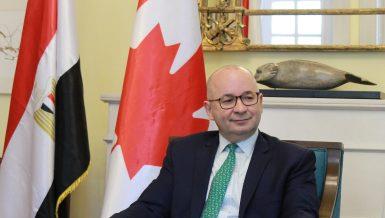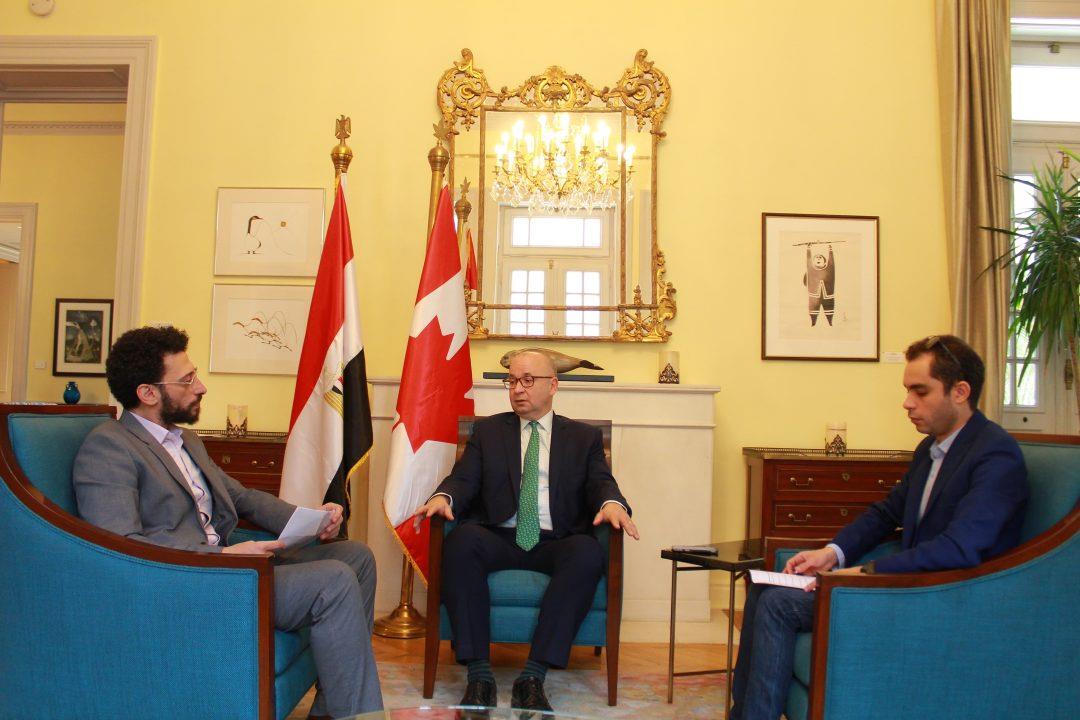(MENAFN- Daily News Egypt)
As his tenure in Egypt draws to a close and Canada and Egypt celebrate 70 years of diplomatic ties, Canadian Ambassador Louis Dumas spoke with Daily News Egypt in an exclusive interview.
The conversation covered a range of topics, including Canada's position on the recent Israeli actions in Gaza, its enduring support for a two-state solution in the Middle East, and ongoing efforts to support the Palestinian territories.
Additionally, Ambassador Dumas emphasised the strength of the diplomatic and economic relationship between Canada and Egypt, highlighting areas of collaboration such as trade, human rights, and cultural exchange.

Regarding the recent Israeli assaults on the Palestinian city of Rafah, what is Canada's stance on this issue and the Palestinian state?
The events in Gaza, particularly in Rafah, are absolutely horrendous and totally uncalled for. Canada has been very clear from the onset that we want an immediate ceasefire in Gaza. We also call for the return of the hostages and for people to sit down and think about the future. Canada supports a two-state solution in the Middle East, with a safe and secure Palestinian state and a safe and secure Israeli state to bring prosperity to the region. We will recognize the state of Palestine when the time comes. Canada has been a partner in peace in the region since 1956, and we are committed to a peaceful Middle East, advocating for an immediate ceasefire.
What kind of diplomatic pressure is Canada applying to address this conflict?
We've taken several steps. Canada was one of the first countries to provide aid to Gaza, contributing approximately $200m since the conflict started. Politically, Prime Minister Trudeau has contacted the Israeli Prime Minister multiple times to advocate for a ceasefire. Our Minister of Foreign Affairs, Mélanie Joly, has visited Israel, Jordan, the Palestinian Authority, and Egypt to push for a ceasefire. In Parliament, we have suspended the sale of arms to Israel, a move that was well-received by the Canadian population. Additionally, we are witnessing respectful debates and peaceful protests in Canada about the situation.
Can you elaborate on the efforts exerted by Canada in collaboration with Egypt in this regard?
Our minister has been in frequent contact with her Egyptian counterpart. We participated in the Cairo Peace Summit in November 2023, and our Minister of International Development Ahmed Hussen has visited Egypt numerous times. I recently took him to Rafah to witness firsthand Egypt's efforts to bring aid into Gaza. We must also not forget the West Bank, where Palestinians living in peace are being displaced by Israeli settlers. Canada has sanctioned certain Israeli settlers by placing them on our unwelcome list. We are operating at different levels, but we need more countries to participate in these efforts.
How does the Canadian government receive feedback from Israel when applying pressure, particularly regarding a ceasefire?
It's not easy. Israel has its own mindset and vision about the conflict. When we call for a ceasefire, Israel is not happy with Canada's position, which complicates things. However, we must uphold our values of prosperity and peace. Our ambassador in Tel Aviv has been extremely active in pressing the Israeli government, and we are committed to sharing our values with our Israeli counterparts at every opportunity.
Has there been a shift in Canada's stance towards Iran, particularly considering recent attacks in the Red Sea?
Canada has participated in efforts to stop missiles and drones targeting ships in the Red Sea.
Canada has a very difficult relationship with Iran, especially after the downing of flight PS752 by the Iranian military, which had many Canadians on board. Since then, we have insisted on bringing Iran to justice, but Iran has refused. Despite having a large Iranian population in Canada, the relationship with Iran presents significant challenges due to its influence in the region, including in Yemen and Lebanon.
Moving to bilateral relations between Egypt and Canada, what is your vision for the future of these relations, and how do you evaluate the current status?
The past four years have been extremely positive, marking the 70th anniversary of diplomatic relations between Canada and Egypt. However, recent economic problems in Egypt have limited our trade expansion. Despite this, there is great interest from Canadian companies in sectors like petrochemicals, green environment, and mining. It's crucial that our trade results in mutual prosperity. A prosperous Egypt will mean more business for Canadian companies, creating a win-win situation.
Can you outline Canada's stance on the human rights situation in Egypt?
Canada is very clear about human rights. We acknowledge that the political and security situation in Egypt is different from Canada's, but there are fundamental principles that must be respected. Pretrial detention and media freedom are areas of concern for us. We engage in respectful debates with Egypt on these issues, committed to the success of Egypt and willing to have tough conversations.

Is there any type of Canadian support for human rights initiatives or organizations in Egypt?
Our main focus is on women's empowerment. Through our development programs, we support women's entrepreneurship in various cities, providing funding and expertise to help women succeed and bring stability to their homes.
What challenges do Canadian businesses face in Egypt?
Canadian businesses are excited about the opportunities in Egypt, but recent economic problems have been a major drawback. Issues like payment in foreign currency for Canadian goods have required intervention to find resolutions. There is also a need for greater rigour in resolving trade disputes impartially to build confidence among Canadian investors. Despite these challenges, trade between Canada and Egypt is flourishing, with $1.8bn exchanged both ways, making Egypt one of Canada's largest trading partners in Africa.
What are the Canadian efforts to promote cultural exchange between the two countries?
We aim to increase cultural exchanges. Last year, Cirque du Soleil came to Egypt, and this November, Canadian music star Charlotte Cardin will be performing here. We also welcome Egyptian cultural exhibitions in Canada and strive for more cultural exchange in a post-COVID environment.
Can you elaborate on the cooperation in the education sector?
Several schools in Egypt offer a Canadian curriculum, and Canadian universities like the University of Prince Edward Island and Cape Breton University have a presence here. We also support vocational training and women entrepreneurship through programs with the Ministry of Telecommunications and collaborations with institutions like the International Labour Organization.
Will there be further cooperation on vocational training?
Vocational training is crucial, and we are advancing in this area. While Germany and Switzerland have significant expertise, we are focused on promoting trades like plumbing, electricity, and woodworking, which are essential to building our societies. We are committed to investing in vocational training to bring great value and pride to skilled tradesmen and women.
What are your personal reflections on your current tenure in Egypt?
Reflecting on my current tenure, I am reminded of experiences I had about 30 years ago. It's fascinating to see how some things have changed while others have stayed the same. This period has been both challenging and rewarding, offering a unique blend of personal growth and professional development. On a personal level, I've had the opportunity to immerse myself in Egyptian culture, forging connections and understanding the nuances of this vibrant society. It's been a period of deep reflection and learning, reminding me of the importance of cultural exchange and mutual respect.
How about the professional side, particularly regarding Egyptian and Canadian diplomatic relations? Have there been any challenges?
Professionally, there have certainly been challenges, but they have also come with significant achievements. I like to think of Canada and Egypt as two brothers: we have our agreements and disagreements, which is natural in any relationship. These disagreements are part of our diplomatic engagement and help us grow stronger. Despite any differences, our commitment to each other's success remains unwavering.
As an ambassador, my role extends beyond merely managing diplomatic ties. It's also about ensuring the well-being of my team at the embassy. During Egypt's recent economic difficulties, providing stability for my team has been a priority. We've managed to offer a respectful package that helps them navigate these tough times, which I consider a personal success.
From a broader perspective, promoting Canadian values in Egypt has been a cornerstone of my tenure. We've worked diligently to enhance bilateral ties, focusing on increasing prosperity and strengthening people-to-people connections. Our efforts during the crises in Sudan and Gaza, where we assisted numerous individuals with Egypt's cooperation, are particularly noteworthy. Additionally, maintaining Egypt's safety has been a critical aspect of our work, involving collaboration with defence partners and contributing to multilateral forces in the Sinai. These initiatives underscore our commitment to Egypt's security and prosperity.
What are your plans after leaving your position?
That's an excellent question and one that I've been contemplating quite a bit. My wife, who is currently in Canada, has been asking me the same thing. Initially, I plan to take a month off to rest and recharge. This role is incredibly demanding, and I believe it's essential to take some time to recuperate. Sleep, exercise, and reconnecting with family and friends will be my primary focus during this period.
After that, I hope to engage in activities that allow me to give back to the community, particularly to the younger generation. There are many talented and ambitious individuals in both Egypt and Canada who share my values of peace, learning, and community. I aspire to mentor these young people, sharing the lessons I've learned throughout my career and encouraging them to pursue their aspirations.
What do you miss most about Canada?
The change of seasons is something I miss dearly. In Egypt, the climate feels like one long summer, with only subtle differences throughout the year. In contrast, Canada offers a vivid experience of all four seasons, each bringing its ownunique charm. The crispness of autumn, the serene beauty of winter, the renewal of spring, and the warmth of summer each hold a special place in my heart. The different temperatures, smells, and light associated with each season evoke a sense of nostalgia and remind me of the diverse beauty of my homeland.
Do you plan to maintain connections with Egypt after you leave?
Absolutely. Egypt has become a second home to me, and I am deeply invested in its future. I look forward to returning and witnessing the country's progress firsthand. I am particularly interested in observing how Egypt navigates its demographic explosion. With a high birth rate and a young population, it's crucial to ensure that the youth are well-nourished, educated, and provided with ample job opportunities.
I also hope to continue engaging with the Egyptian people, who have been incredibly warm and welcoming. Downtown Cairo, with its stunning architecture and cultural vibrancy, is a place I hold dear. I understand the logic behind the new capital and the efforts to refurbish the downtown core, and I am eager to see these projects come to fruition.
How will you handle the shortage of mangoes in Canada?
Ah, the mangoes! That's definitely a challenge. Mango season in Cairo is something I look forward to every year. The flavours are simply unparalleled. I will certainly plan my visits around the mango season, from June to August, to indulge in this delightful fruit. It's a small but significant part of my connection to Egypt, and I wouldn't want to miss it.
MENAFN06072024000153011029ID1108413179